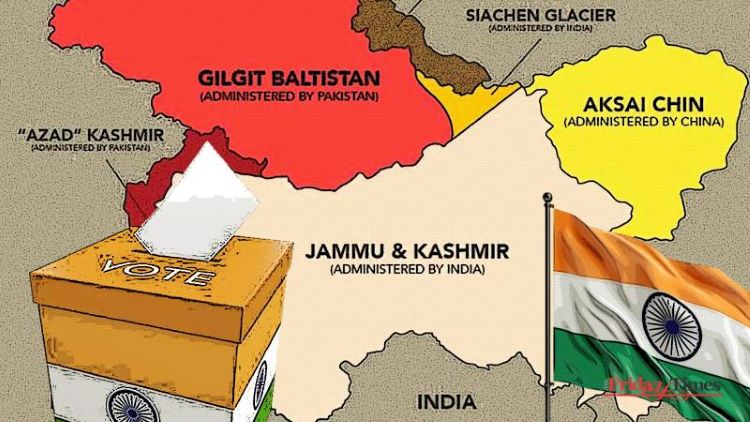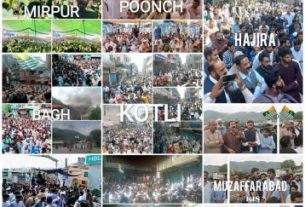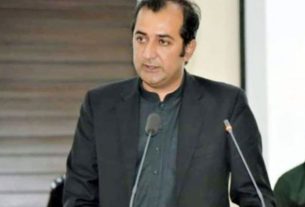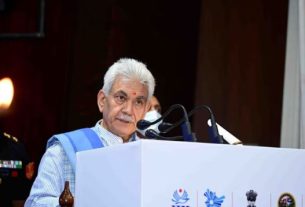Although the BJP’s chances of electoral success may have diminished elsewhere in India, the circumstances in Jammu & Kashmir are indicative that the party’s long-term carrot and stick strategy has come to fruition.
Jammu and Kashmir is holding elections, and there is an eerie silence in the region. Even the ruling Bharatiya Janata Party, whose manifesto touts stripping the state of its special status via the abrogation of Article 370, as a memorable achievement of the Modi government’s last decade in power is underplaying the feat in its pompous canvassing.
The state, now downgraded to Union Territory (a lesser federal entity than a province), is holding the elections to five parliamentary seats in five phases. Of these two, BJP is confident of winning two (both in the Jammu region). The party is not even trying to contest the other three Valley seats, which are slated to be grabbed by the opposition.
The reason: post-abrogation of Article 370, the BJP has focused solely on nurturing or arm-twisting Kashmiri leaders into “patriotic” mode. The rest – separatists or azadi-seekers – are either languishing in jail, or have been buried into obscurity.
This has been the game-plan of BJP and the Modi government, and it is working as per the script.
In most of the parliamentary elections in the state in the past, the voter turnout has been recorded low and elections were marred by violence that New Delhi blamed on Pakistan. Similarly, local body or panchayat polls have seen similar backlash and many candidates who won such elections were murdered in targeted assassinations.
However, the 2024 elections have so far not witnessed any untoward incident. Neither excessive enthusiasm nor protest has marked its presence. Optimists like Rahul Pandita see this change – the acceptance of elections – as a remarkable metamorphosis in the attitude of Valley Muslims. He also reads that BJP has been able to make inroads into Valley politics through its “proxies.”
“This change has happened because the majority of Kashmiri Muslims have understood that it is better to be on the winning side. Already, there are individuals, previously opposed to BJP and to Modi in particular, who are now openly singing his paeans and have suddenly turned ‘patriotic.’ There are chances that in BJP’s futuristic gameplan in Kashmir, they may get to play a role by acting as the party’s proxies in Assembly elections that Modi and others have promised will happen soon,” Pandita wrote in his report for the Open magazine.
After delimitation in J&K, there are only five seats left for parliamentary polls: Baramulla, Srinagar, Anantnag-Rajouri, Jammu and Udhampur. Ladakh seat is now part of the Ladakh UT, which was carved out after bifurcation of the state along with abrogation of the Article 370.
BJP has fielded candidates in Jammu and Udhampur and for the rest of three seats, it has only appealed to the voters to not vote for Farooq Abdullah’s National Conference, Mehbooba Mufti’s People’s Democratic Party and Congress.
Admitting his party’s well-thought out Kashmir election agenda, BJP’s Jammu and Kashmir President Ravinder Raina said this decision of not contesting from the Valley was keeping in mind the bigger goal and that on these seats BJP will support parties that are “patriotic.” Prominent among these “patriotic parties” is People’s Conference, led by Sajad Lone, who is contesting from the Baramulla seat. There is also the Apni Party, whose leader Altaf Bukhari is also seen as someone propped up by New Delhi. The two have now decided to go together, supporting each other’s candidates in the Valley.
Lone is pitted against National Conference’s Omar Abdullah. He is so confident of winning this election that he said in a rally that if Abdullah’s party wins any seat this time, he would quit politics.
Though both NC and PDP had forged alliances with BJP in the past, helping the saffron party to enter the Valley, they came together to impede BJP’s march after the Article 370 and 35A were abruptly annulled on 5 August 2019. Leadership of both the parties were put under house arrest and were released after months of “negotiations.”
Both the parties, along with a few others, formed the Gupkar Alliance to counter BJP in the Valley. It asked for “restoration of democracy” in the state. But in two years, fissures began to appear in the alliance. As NC and PDP failed to arrive at a quid pro quo, they decided to contest the parliamentary elections independently in Kashmir Valley, while supporting Congress in two seats in the Jammu region.
This works well for BJP as votes against it will get split.
The outcome of the parliamentary elections could set the tune for the assembly polls, indicating the strength of the parties in the Union Territory.
In order to win back the trust of jilted Kashmiris, the BJP leadership, instead of directly contesting the election from the Valley, has decided to make a lofty announcement. Recently, Indian Home Minister Amit Shah announced that the government is looking to lift the draconian Armed Forces Special Powers Act (AFSPA) from certain civilian areas. He also added that the reduction in the number of Indian troops was also under consideration. Even though no concrete follow-up has taken place after this “assurance.”
Meanwhile, there are reports that the government has freed a number of people, mostly youngsters, who were incarcerated for taking part in protests and stone-pelting at Indian security forces. In addition, special assistance and scholarships are being provided for Kashmiris to take admissions in mainstream educational institutions anywhere in India. And achievers like those excelling in sports, entrepreneurship, science, innovation, arts, cinema, literature, etc have been recognized on priority basis after August 2019.
Many of such achievers have been honored with national awards, including the Padma titles – the state’s highest civilian recognition.
These efforts, clubbed with Indian state’s heavy-handed methods like chasing anyone deemed “collaborators” of militancy, feel reporters who have toured the Valley in recent months, have dried out the separatism in Kashmir. “Very few major incidents of militant attacks have taken place of late. Almost all the separatist brass active in the Valley has either been jailed or they have shunned the path and begun to come to terms with the change. Those who have even indirectly helped militants have had agencies like the National Investigation Agency (NIA) come to their door,” a reporter who is in the Valley for the election coverage told The Friday Times.
Among “patriots” that the BJP government has cultivated among Kashmiris are once youth icons like resigned and reinducted Indian Administrative Services officer Shah Faesal and former fiery student leader from Delhi’s Jawaharlal Nehru University (JNU) Shehla Rashid Shora. They both were kept under house arrest and later resurfaced, “redeemed,” praising Prime Minister Narendra Modi and asserting their firm belief in Indian democracy.
This “change of heart” may not reflect “true change” in Kashmir and Kashmiris, but it surely makes evident that if the BJP comes back to power, even without any parliamentary seat in the Valley, “several changes” will be on the cards.__The Friday Times Pakistan





